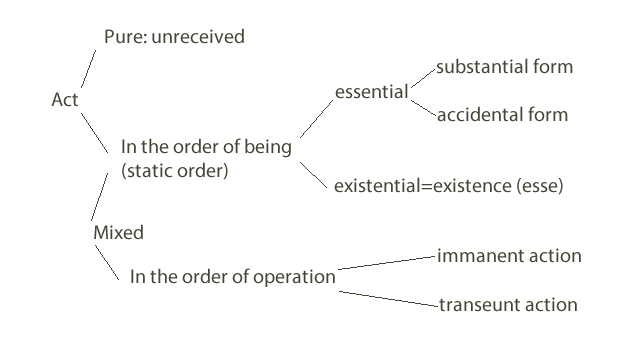Introduction to the Philosophy of St. Thomas Aquinas
Ch 6: Act and Potency
3. Act
a) Meaning of act. Act, like potency, is a primary notion which can only be grasped through example and illustration. Aristotle takes note of this circumstance; "we must not," he cautions, "look for a definition of everything but be satisfied to grasp the analogy, that it [act] is as what builds is to what is capable of building; as waking to sleeping; as what is seeing to what has eyes shut but has sight; as what has been fashioned out of matter to the matter; as what has been wrought to what is unwrought. Let act stand for the first member of these opposites, and potency for the other." 10 St. Thomas, in the wake of Aristotle, puts all this to summary when he says, "Act is when a thing is, but is not as in potency." 11
Thus, one reveals the other. Potency is characterized and expressed by relation to act; act, in turn, is manifested through contrast with potency. Nevertheless, there is a notable difference; for, while act is included in the very notion of potency (dicitur ad actum), the converse is not true, act does not necessarily imply potency. The first meaning of act is completed being, which may be only relatively complete. However, we do know of a pure act which is relative to nothing. Act, in short, is prior to potency, hence not necessarily attended by a potency. More about this as the chapter progresses. For now, suffice it that the positive meaning of act is completed being, which is to say perfection, whereas potency always conveys the opposite, imperfection.
b) Division of act. Aristotle, after elucidating the notion of act by citing concrete instances, calls attention to its being analogous and, without further ado, distinguishes the two typical varieties; act, he says in effect, is in one sense as movement to potency, in another as substance (i.e. form) to some kind of matter.12 This, more simply, is the distinction between operative and entitative act, or act as operation and under its static aspect.13 And since we are dealing with an analogous concept, one of these, the operative act, may be taken as the primary analogate, whence is derived the notion of the other.
Equally well established are a number of other distinctions, and first of all, that of pure and mixed act. Pure or unreceived act is void of all potency and is not received into a potency." Mixed act, as the name implies, admits of potency, hence is any act that enters into composition with potency. Mixed act, moreover, can be divided according as it pertains to form or to operation. In the static order (spoken of above) mixed act may refer to the essence, hence essential act, or to existence, existential act. In the dynamic order (operation) occurs the distinction of spiritual activity, or immanent act, and physical activity, transeunt act. In skeleton, the distinctions are:

Footnotes
10 Metaph. 0, 6, 1048 a 36-1048 b 5;11 "Actus est quando res est, non tamen est sicut in potentia" (cf. In IX Metaph. lect. 5, no. 1825; Aristotle, Metaph. 0, 6, 1048 a 31).
12 Metaph. 0, 6, 1048 b 8.
13 The author, here, apparently parts company with the more usual terminology, for entitative act is perhaps better said of esse than of essence (substance or form, it should not be forgotten, being of the essential order). - [Tr.]
14 In a being where essence and existence are distinct pure act can only be said, if at all, of its essence, for such a being is obviously not pure act or unlimited in every respect; the case in point is, of course, the angelic essence. But where, as in the unique case of God, essence and existence are identical, the pure act of essence is the pure act of existence; needless to say, this is the meaning of pure act in the unqualified sense - [Tr.]